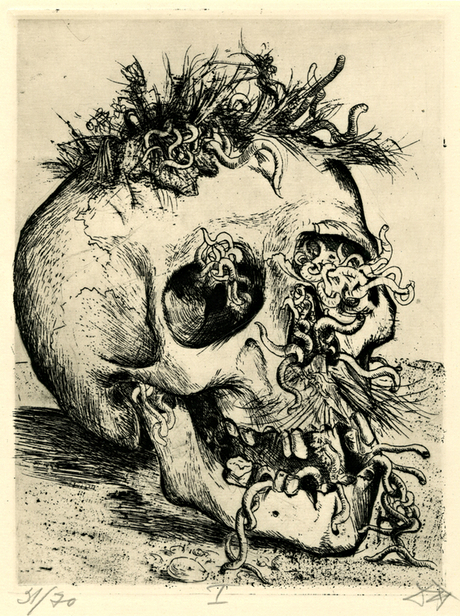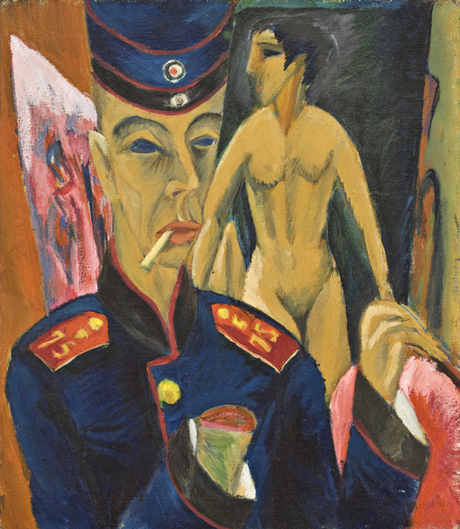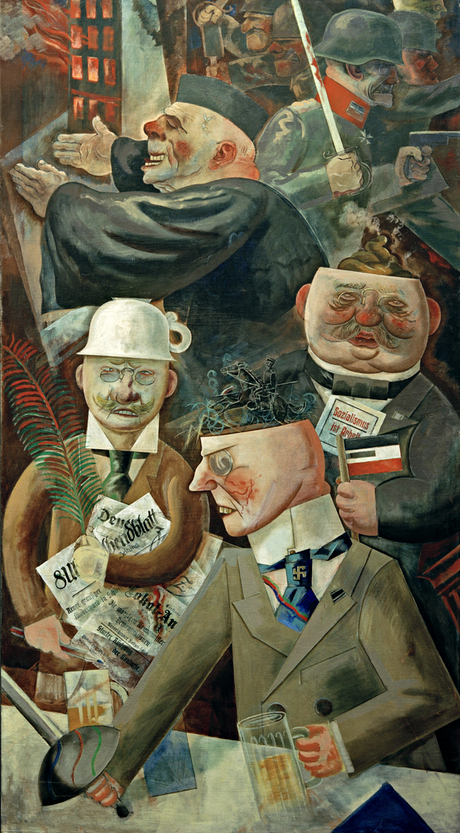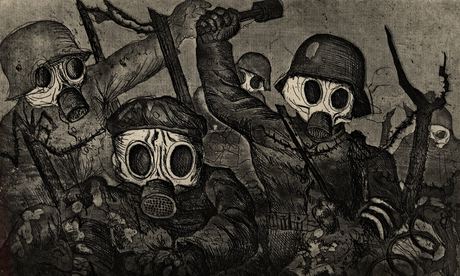In 1924 the German artist and war veteran
Otto Dix looked back at the
first world war
on its 10th anniversary, just as we are doing on its 100th. What did he
see? Today there is a fashion, in Britain, to celebrate the heroism of
our grandfathers and their hard-won victory of 1914-1918. It's as if the
clock is being turned back and the propaganda of the war believed all
over again. Even the German war guilt clause written by the victors into
the
Treaty of Versailles
in 1919 has been turned into "fact" – after all, who wants to trawl
through the complex causes of this conflict and face the depressing
truth that it ultimately happened because no one in July 1914 understood
how destructive a modern industrial war could be?
We need to
shake off the nostalgia of a centenary's forgetful pomp and look at the
first world war through fresh eyes – German eyes. For no other artists
saw this dreadful war as clearly as German artists did. While British
war artists, for example, were portraying the generals, Germans saw the
skull in no man's land.
Der Krieg, the series of prints Otto Dix published in 1924, and which is
about to go on view at the De La Warr Pavilion in Bexhill-on-Sea, is a startling vision of the apocalypse that really happened on Europe's soil 100 years ago.
A
German soldier sits in a trench, resting against its muddy wall. He is
smiling, but the grin is empty and hollow-eyed – for his face is a bare
skull. He has been dead a while. No one bothered to bury him. His helmet
is still on his skull, and his boots reveal a rotting ankle. In another
print, a severed skull lies on the earth. Grass has grown on its crown.
More grass resembles a moustache under its nose. Out of the eyes,
vegetation bursts. Worms crawl sickeningly out of a gaping mouth.
 Otto Dix's Skull, from his 1924 set of first world war drawings, Der Kreig Photograph: British Museum/DACS
Otto Dix's Skull, from his 1924 set of first world war drawings, Der Kreig Photograph: British Museum/DACS
Dix had seen these things as a frontline soldier. At the time, he
later confessed, he did not think about them too much. It was after he
went home that the nightmares started. In what might now be called
post-traumatic stress, he kept seeing the horrors of the trenches. He
was compelled to show them, with nothing held back.
The prints
gathered in Der Krieg (The War) are just part of the hideous outpouring
of images he unleashed. It was as if Dix needed to vomit his memories in
order to purge himself of all that haunted him. He engraved these
black-and-white vignettes just after painting
The Trench,
a horrific masterpiece that distilled the western front into one grisly
carnival of death. The painting was hugely controversial, and in 1937
the Nazis included it in the notorious
Degenerate Art
exhibition that vilified modern German artists like Dix. The
confiscated painting vanished during the second world war, perhaps
burned in the bombing of Dresden.
Even with that loss, Dix's war
art is a gut-wrenching act of witness. Yet he was not alone. He was part
of a radical art movement that rejected the conflict and the European
civilisation reponsible for it.
It was not at all obvious that a
man such as Dix would create some of the defining pacifist images of the
20th century. In 1914 he was a fierce German patriot who joined up
enthusiastically. He became a machine gunner and fought at the
Battle of the Somme,
efficiently mowing down British troops. He won the Iron Cross (second
class) and began training to be a pilot. How did this courageous soldier
turn into an anti-war artist?
To understand that, we need to
comprehend that, during the first world war, a radical minority of
Germans turned to artistic and political revolution, rather than
nationalism. Like the British war poets, Germany's young artists came to
hate the war, but unlike the poets, they organised to resist it.
Many simply could not take the front. Like Dix, the brilliant expressionist painter
Ernst Ludwig Kirchner
joined up in 1914, but his mental health soon collapsed. In his 1915
painting Self-Portrait as a Soldier (currently in the National Portrait
Gallery's exhibition
The Great War in Portraits),
he gives visual form to shell shock. The painter stands in uniform, his
face yellow and eyes dazed, lurching like a sleepwalker, his right hand
severed at the wrist.
 'Giving visual form to shell shock' … Ludwig Kirchner's Self
Portrait As Soldier (1915). Photograph: National Portrait Gallery
'Giving visual form to shell shock' … Ludwig Kirchner's Self
Portrait As Soldier (1915). Photograph: National Portrait Gallery
Kirchner had not really lost a hand. The bloody stump he waves is an
image of artistic and sexual despair – war has unmanned him. Kirchner's
pre-war paintings were sensual primeval nudes, but in his 1915
self-portrait he has turned helplessly from a naked model. It is not
only a hand that has been amputated, but his very life force.
Like Dix and Kirchner, the poet
Hugo Ball
wanted to fight. He failed the medical three times. Visiting Belgium so
he could at least see the front, he was so shocked that he turned
against war, fled to Switzerland with his girlfriend, cabaret singer
Emmy Hennings, and in 1916 founded the Cabaret Voltaire in Zurich. This
was the birthplace of
Dada,
the most extreme art movement of the 20th century, which used nonsense,
noise, cut-ups and chaos to repudiate war. "The beginning of Dada was
really a reaction against mass murder in Europe," said Ball.
Dada
was the counter-culture of the first world war, just as psychedelia was
to be the counter-culture of Vietnam. At a time when supposedly rational
decisions sent so many to their deaths – in 1916, the year Dada began,
General Haig ordered an advance at the Somme that killed 19,000 British
soldiers on a single day – Dada feigned madness. Its angriest
practitioners were Germans.
Helmut Herzfeld wasn't so sure he
wanted to be German, however. In 1916 he got so sick of the war's
relentless propaganda that he changed his name to
John Heartfield
– a shockingly subversive adoption of the enemy's language. He got out
of the army by pretending to be mad, and then, sent to work as a
postman, threw away the mail to hinder Germany's war effort.
In
1919, at the First International Dada Art Fair in Berlin, Heartfield and
another Dadaist, Rudolf Schlichter, hung a dummy of a German officer
with a pig's face from the ceiling. It is impossible to think of
Britain's generals being portrayed like this – but then Germany had
lost, and Berlin was riven by revolution.
Dix also exhibited at
the Dada fair. He got involved with this revolutionary movement after
meeting its most charismatic exponent,
George Grosz (much
like Heartfield, he adopted the English "George" as a war protest).
While Dix was at the front, Grosz was sending soldiers Dadaist "care
packages" full of satirically useless stuff like neatly ironed white
shirts.
 George Grosz's Pillars of Society (1926) Photograph: Akg-Images/AKS0
George Grosz's Pillars of Society (1926) Photograph: Akg-Images/AKS0
At the 1919 fair Dix exhibited a painting of maimed war veterans
begging on a Berlin pavement. The city was full of damaged men. In
another of his Dada paintings, Card-Playing War Cripples, men breathe
through tubes and use feet to hold cards – they are no longer men, they
are collages.
For it took a new art to do justice to the Great
War. So Dada invented photomontage, a shattered mirror of the violence
done to bodies by war. At the Dada fair in Berlin this was made explicit
when, over the broken bodies painted by Dix, a photomontage by Grosz of
a man who seems horribly disfigured was inserted. This ruined face
resembles photographs of the war's victims – until you realise the "
Victim of Society" is nothing but an Arcimboldo head made of cut-out newspaper pictures.
German
artists showed the war with utter clarity when others turned away.
While the Dadaists were cutting up society, the war veteran Max Beckmann
painted his grotesque vision of a world gone mad, Die Nacht (The
Night). Yet their warnings went unheeded. In 1924 Dix's war engravings
were shown in an anti-war exhibition. In less than a decade he would be
living in internal exile, a banned "degenerate artist", while leaders
with very different memories of the first world war laid the foundations
of the second.
The truth survives. In his 1924 drawing
How I Looked as a Soldier,
Dix portrays himself holding his machine gun. He's unshaven under
his helmet and his eyes are narrow slits. Dix the truth-teller looks
back at Dix the killing machine.
• Otto Dix's Der Krieg prints are at the De La Warr Pavilion, Bexhill on Sea, 17 May-27 July.
The filmmaker Peter Greenaway transforms a life-size digital replica of the Renaissance painter Paolo Veronese’s epic “Wedding at Cana” into a vivid theatrical swirl.












